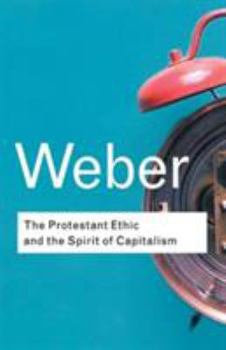The Protestant Ethic and the Spirit of Capitalism
Select Format
Select Condition 
Book Overview
Max Weber's best-known and most controversial work, The Protestant Ethic and the Spirit of Capitalism, first published in 1904, remains to this day a powerful and fascinating read. Weber's highly accessible style is just one of many reasons for his continuing popularity. The book contends that the Protestant ethic made possible and encouraged the development of capitalism in the West. Widely considered as the most informed work ever written on...
Format:Paperback
Language:English
ISBN:041525406X
ISBN13:9780415254069
Release Date:May 2001
Publisher:Routledge
Length:320 Pages
Weight:0.79 lbs.
Dimensions:0.7" x 5.0" x 7.7"
Customer Reviews
4 ratings
A C lassic for All Times
Published by Thriftbooks.com User , 19 years ago
Weber's "Protestant Ethic" was originally published in 1904-1905 and later in a second, revised edition (1920). This edition is the second edition, and the translator is Talcott Parsons. In "The Protestant Ethic" Weber famously attempts to explain how the spirit of modern rational capitalism emerged; and he essentially argues that an important part in this process was played by what he termed ascetic protestantism or different types of Protestantism that were activistic and ascetic (most famously Calvinism). Ascetic Protestantism energized businessmen and workers, and valorized a new type of capitalism: rational capitalism which is much more methodical and dynamic in nature than the type of capitalism that existed in Europe in the 1500s ("traditional capitalism"). Today rational capitalism has conquered society and turned it into an iron cage (to use Parsons' famous translation of two words in German that are more accurately - and less imaginatively - translated as "steelhard casing"). "The Protestant Ethic" is by far the most famous sociological study and is unsurpassed in theoretical boldness and creativity. Parsons said that he found it as exciting to read as a detective novel. Most of us have to struggle quite a bit with it - but it is definitely worth it!
Founding book of economic sociology
Published by Thriftbooks.com User , 21 years ago
This book is the founder of the prolific field of eocnomic sociology. It introduces the concept that culture (in the form of the protestant ethic) is better adapted to fit capitalism. Therefore, capitalist growth was found more frequently in protestant societies than in others. Since Webber, there has been much study of this topic, with some of the main names being Lawrence Harrison (focusing on the culture of underdevelopment) and Francis Fukuyama (focusing on how trusting societies benefit economically). Both and others push the frontiers initially established by Webber.Though controversial especially today in the period of political correctness, Webber presents a strong mainly anecdotal case (given the absense of many statistical tools at the time) of why protestant societies succeed in capitalism; his main argument (though there are many other important ones) is that it is socially acceptable in protestant societies to make a profit, whereas it may be considered immoral in other societies, such as catholic ones. This is a good theoretical book with a few good anecdotes. It is for someone interested in the history of sociology, especially as it pertains to economics. If you are just looking for a link between culture or religion and economics, look at Larry Harrison.
The protestant ethic and the spirit of capitalism
Published by Thriftbooks.com User , 24 years ago
This is a very concise and succinct exploration of the role of four major branches of religious thought to come out of the Reformation: Lutheranism, Methodism, Anabaptist and Calvinism. His exploration of ascetism within these specific religious philosophies and their impact on capitalism is as insightful as I have ever read. Having personal and extensive experience amongst some of the reminant religious communities still functioning in North America, I must say his objectivity in a such a subjective subject makes for a lucid and enlightening read. If you do not have some background in Reformation and northern European history of this time, you may miss much of what he's trying to convey. He demonstrates that he is a true scholiast of this subject. Have your dictionary handy!!!
3 Stars For This Is Pure Ignorance.
Published by Thriftbooks.com User , 24 years ago
Weber's Protestant Ethic and the Spirit of Capitalism is CLASSIC - and should be a mandatory read for every student of sociology. Unfortunately, the classic literature of sociology isn't emphasized enough in today's educational institutions. Students are entering the real world without the foundation of social prophets and coming up with their own ideas of "what the world is coming to," and taking credit for ideology that has long been debated and written down by masterminds such as Weber. Pay attention! What is this book really about? This is a revolutionary work discussing critically the causes and effects of sociological chance, and how the sociology of religion has changed meaning because of the philosophy we now base our ideas on. Anyone interested in postmodern theory, the iron cage of bureaucracy, rationalization, and even symbolic interactionism should read this before continuing to literature of modern sociological thought.






